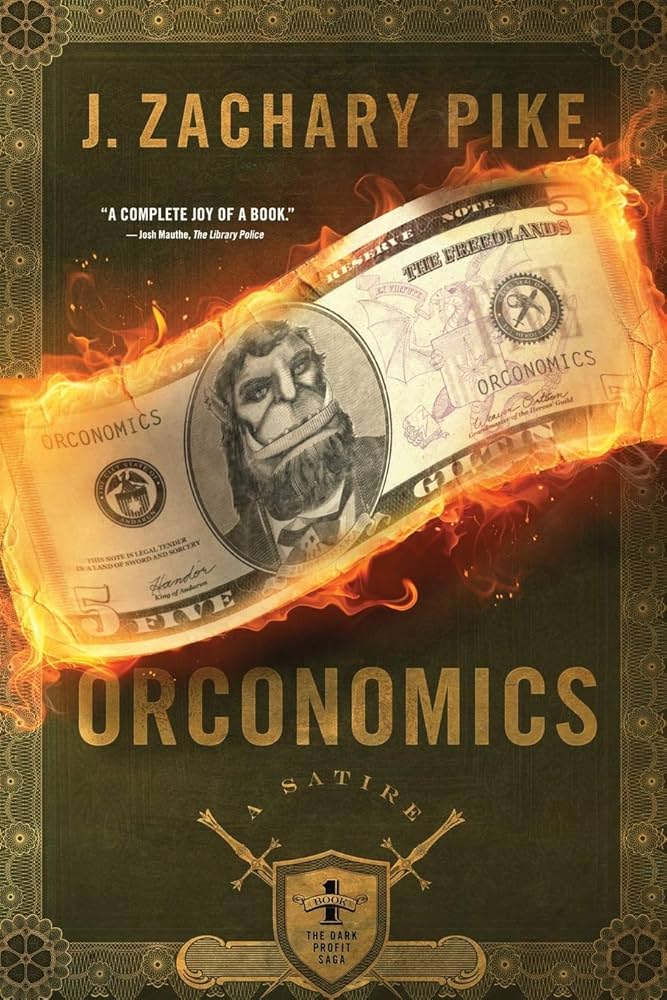Orconomics: A Satire: A Review

How I Learned to Stop Worrying and Love the Free Market
June 2, 2025, 4:47 a.m. by stangoldstein1This is a spoiler-free review
Any fella who has talked with me for more than 10 minutes knows that I’m a big Capitalism guy. Which is why you might be surprised to see that my first review on this site is on a satirical critique of Capitalism – it’s even a positive one! This book does a good job of balancing adventure, humor, and economic discourse in such a way that you don’t get overwhelmed by cynicism, but also don’t get so distracted that you forget what you’re reading about.
Orconomics approaches economics through the lens of a traditional fantasy world. You have heroes, villains, and treasure; but, they’re not what you’re used to. “Hero” is a job title, and as any working professional will tell you, employers do not always choose the best candidates. Heroes behave like Link from A Legend of Zelda in that they do this (https://www.youtube.com/shorts/r4m6hoH12ps) to your house while trying to kill a goblin. But then, charge you $1000 for the trouble. Villains are typically Shadowkin (yeah, that means EXACTLY what you think it does) – they have a tendency to lose to heroes. And then we have treasure. As we all know gold...gold never changes. Unless it’s changing hands, which it does a lot of in this universe.
Heroics is an industry – one that is facilitated by the Heroes’ Guild. However, the Guild is only a small part of the bigger picture. There are a myriad of organizations that issue, provide supplies for, and most importantly, bankroll quests. When a quest is issued, a monster/villain’s hoard assigned a value, is purchased by corporate interests and sold to plunder funds that contain fractions of multiple hoards’ asset rights. Mind you, this is all done before the quest is even completed or the actual hoard is obtained. Don’t worry about that though, this is an excellent investment opportunity – Lamia Sisters is too big to fail anyway.
The actual storyline of this book focuses on the dwarf Gorm Ingerson. Gorm is a former professional hero who spends his time avoiding Guild justice and feeling sorry for himself. He has bantz though, so we forgive him for that. One day, Gorm acts out of character and does someone a favor without expecting anything in return. Shortly after that, he is given the opportunity to redeem himself and reclaim his old place in society. Too bad it’s probably a suicide mission. Gorm and his newly acquired band of weirdos are going to give it a shot though, and they may learn a little more about how the world works than they’re supposed to.
Not every chapter is told from Gorm’s perspective. We’ll often shift perspectives to other party members so we can better understand everyone’s goals and decisions. The story will also change focus to characters that are seemingly unrelated to the main quest. These serve as excellent worldbuilding opportunities and allow us to see the various cogs in the machine that is Arth’s economic engine. Some people don’t like diversions from the main story, but I’m a sucker for worldbuilding, so I appreciate these diversions.
One thing I feel Orconomics really excelled at was its dialogue. You have a variety of personalities, many of which are clashing at any given time. The author does a good job of juggling these conversations while keeping everyone in character. I really enjoy the cadence of conversations (or inner dialogue) when the sharper characters in the cast are engaging. The characters in this book can banter.
The author is clearly bad at writing romance. He does a good job of avoiding this most of the time by making dwarves (conveniently the race of his main character) asexual and totally averse to any talk even hinting at affection greater than friendship. This is also shown in two of this book’s subplots. I will not provide additional details to avoid spoilers, but it’s definitely one of the book’s flaws.
Overall, this a very good book, even if I probably disagree with the author on the finer points of economic policy. I would give it a 7.5/10, which if you’ve seen how I rate things, is a very good score. It’s definitely not for everyone though, and I totally understand if you find that it’s not your cup of tea. I want to note that I listened to the audiobook version of this story. The narrator does a good job and that has definitely impacted my impression of things in a positive way. He is not great when it comes to female voices, but it’s not to the point where it’s grating. I recommend giving this book a try, whether it be in audio or text format. If you do listen to the audiobook, you should know that there is a glossary at the end of the book. It won’t spoil anything, so you could choose to listen to it first. This is not a necessary endeavor though, as the book explains things well.
This book is the first of a trilogy, and was good enough that I have already picked up the next two books. I have just started on the second installment and look forward to experience more of the world of Arth.
